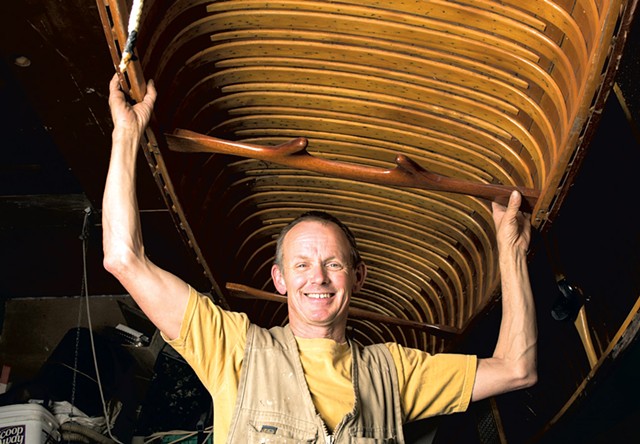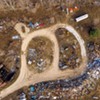Published June 15, 2016 at 10:00 a.m. | Updated June 16, 2016 at 12:15 p.m.
Name: Scott Barkdoll
Town: Middlebury
Job: Wood and canvas canoe builder
On a dead-end country road surrounded by rolling farm fields south of Middlebury, Scott Barkdoll builds and refurbishes wood and canvas canoes. His classic works evoke a simpler time of communing with the wilderness. Barkdoll, now 52, has been making things with his hands since he was 5 years old and building tree houses in Pennsylvania. Over the years, he has remodeled two houses and built three houses from scratch.
The son of a farmer, carpenter and itinerant preacher, Barkdoll grew up in Pennsylvania, Illinois, New Mexico and West Virginia. As an adult, he worked as a carpenter for a decade before visiting Connecticut's Mystic Seaport in 1990, where he saw a display of wooden canoes and fell in love.
In 1992, Barkdoll founded Skywoods Canoe Company. Over the past 20 years, first in Michigan and since 2004 in Vermont, he has built, bought, sold and renovated more than 1,000 wood and canvas canoes, he says. He's a member of the Wooden Canoe Heritage Association, which will hold its annual assembly July 12 to 17 at Paul Smith's College in upstate New York.
Barkdoll has taught wooden canoe building for various museums and organizations around the region and is a mentor to many aspiring builders. He took time out to talk with Seven Days about his craft.
SEVEN DAYS: What are your specialties within the wooden canoe community?
SCOTT BARKDOLL: In the winter of 1998 I built my first canoe molds. I have five different canoe models that I've built, and since then I have built around 30 of them. My two specialties are the smaller boats, like the 12-foot model called Dancing Girl, and then, on the other end, working on the great big war canoes that are 25 feet and longer, built mostly for summer camps.
SD: What do you like about your work?
SB: There are often great stories that come with canoes I work on. Many times the younger generation takes on restoring an old family heirloom for Mom or Dad's birthday or a family reunion. I once asked a very old grandmother about how she got her canoe (circa 1920), and she answered, "My dad bought it for me as a reward for stopping smoking." Another [customer] was a Boy Scout whose trip to the big jamboree was canceled due to a flu epidemic, so he got a canoe instead that summer. Becoming friends with customers is a lot of fun.
SD: What has been your biggest professional challenge?
SB: Reconstructing a 35-foot war canoe that came to me in two pieces. It was apparently broken apart by a horse that was tied to it. Rebuilding that was a real challenge! I've built canoes that have gone to British Columbia, Newfoundland and Australia.
SD: Where do you get the wood you work with?
SB: I buy Vermont northern white cedar, mostly from Goodridge Lumber in Albany, Vt., and a little bit from Shelburne Farms. Cedar steam-bends really well and is rot-resistant. The trim on the canoes is typically ash or cherry.
SD: What makes wooden canoes special or different from your average plastic boat?
SB: There's something aesthetically pleasing about wooden canoes. There's something magical about them on the water that lets you get closer to wildlife. The late [canoe builder] Jack McGreivey of Cato, N.Y., once said that wooden canoes are the perfect mating of art, craft and nature.
SD: You've paddled the Breaks of the Upper Missouri River in Montana, all around Michigan, the Adirondacks and around Vermont. Where do you paddle locally?
SB: I paddle on Otter Creek in Middlebury, from Pulp Mill Bridge to Belden Falls, and really enjoy that section.
SD: What's the best thing about your work?
SB: It's all I've ever known. I've loved working with wood my whole life. I really like the phrase I've heard at Yestermorrow [Design/Build School in Waitsfield], and that is, "Think with your hands."
The original print version of this article was headlined "Shipshape"
More By This Author
Speaking of...
-

Do You Canoe? Notes From a Paddlers Gathering
Mar 16, 2016 - More »
Comments
Comments are closed.
From 2014-2020, Seven Days allowed readers to comment on all stories posted on our website. While we've appreciated the suggestions and insights, right now Seven Days is prioritizing our core mission — producing high-quality, responsible local journalism — over moderating online debates between readers.
To criticize, correct or praise our reporting, please send us a letter to the editor or send us a tip. We’ll check it out and report the results.
Online comments may return when we have better tech tools for managing them. Thanks for reading.













































